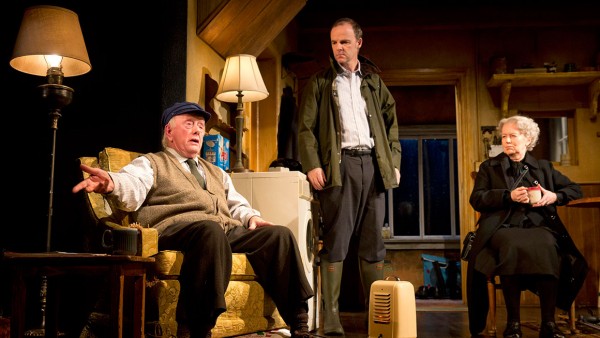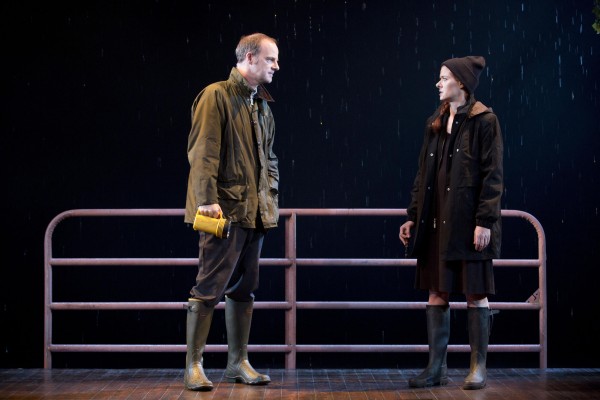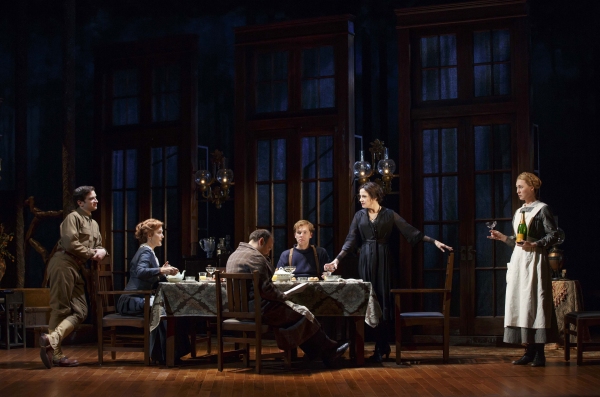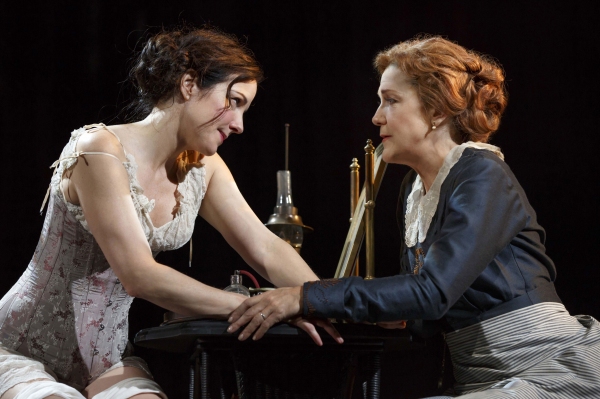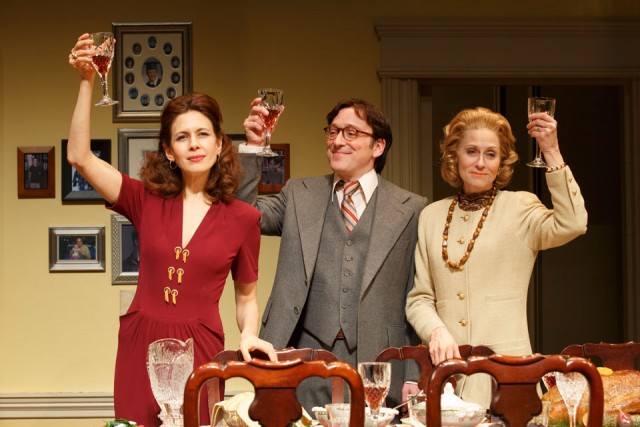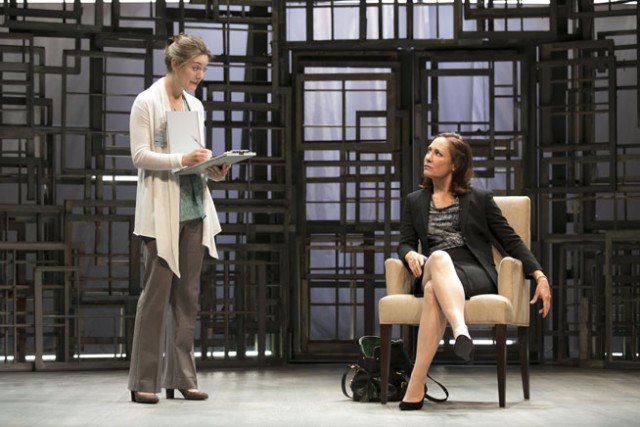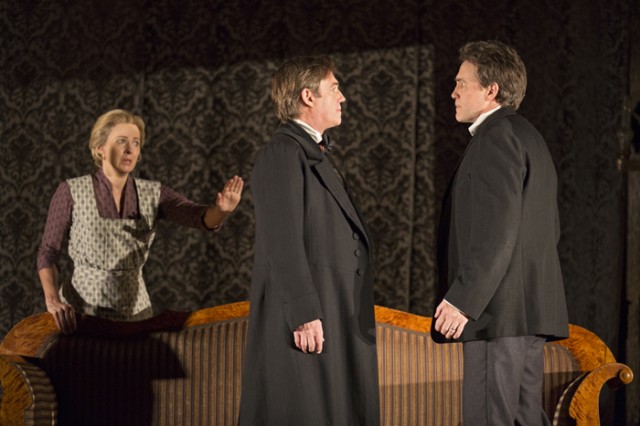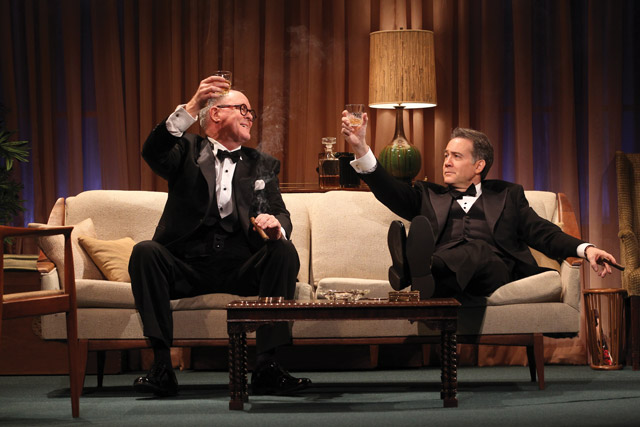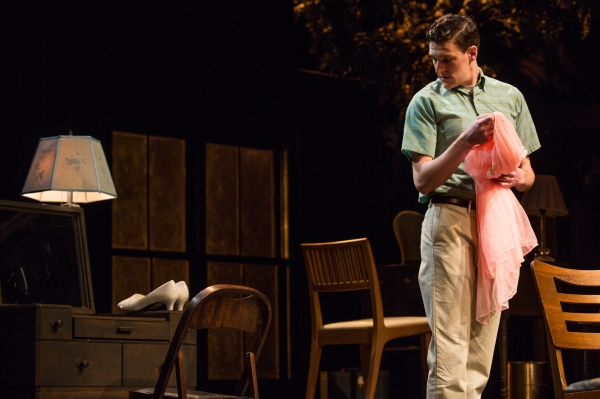
Jonathon (Gabriel Ebert) contemplates becoming Miranda in front of other people in CASA VALENTINA (photo by Matthew Murphy)
Manhattan Theatre Club at the Samuel J. Friedman Theatre
261 West 47th St. between Broadway & Eighth Aves.
Tuesday – Sunday through June 15, $67-$125
www.manhattantheatreclub.com
www.casavalentinabroadway.com
“Welcome to the Chevalier d’Eon Resort. Welcome to the world of self-made women,” Valentina (Patrick Page) announces in Harvey Fierstein’s sensitive and engaging, if occasionally didactic, new play, Casa Valentina. Fierstein’s first drama in more than a quarter century, following such hit musicals as Kinky Boots, Newsies, and La Cage aux Folles, Casa Valentina was inspired by the true story of a husband and wife who ran a Catskills bungalow in the 1960s where men would spends weekends cross-dressing and acting like women, a safe haven where they could celebrate their feminine side. The show takes place in June 1962 as Valentina, who spends her weekdays as George, and his wife, Rita (a wonderfully sensitive Mare Winningham), prepare for their latest arrivals. Among the attendees are Jonathon (Gabriel Ebert), a shy, nervous young man who will be making his first-ever appearance as Miranda; Bessie (Tom McGowan), a military veteran with a wife and kids who glories in the freedom Casa Valentina gives him; Gloria (Nick Westrate), a stylish woman who looks like she stepped out of an episode of Mad Men; Terry (John Cullum), a septuagenarian who tells Miranda, “You don’t get cleavage. You earn it”; and a respected judge (Larry Pine) who revels in becoming Amy away from his stressful regular life. The guest of honor for the weekend is Charlotte (Reed Birney), a radical cross-dresser who wants the others to join the Sorority, an organization that is attempting to change the public perception of and laws against transvestitism. “I firmly believe that once the world sees who we truly are, there will be no need for deception,” she says. However, membership includes signing an oath against homosexuality, something that makes the rest of the women more than a little uncomfortable.

Charlotte (Reed Birney) gets political at a Catskills bungalow in new Harvey Fierstein play (photo by Matthew Murphy)
Lovingly directed by two-time Tony winner Joe Mantello (Assassins, Take Me Out), Casa Valentina is at its best when it celebrates the joy these men experience by being accepted as women for a few treasured days. The show gets bogged down a bit when dealing with the oath, although it does bring up the critical point that the vast majority of cross-dressers — recent studies put the number around eighty percent — are heterosexual. Even with the growing acceptance of same-sex marriage in America, there are still gross misconceptions of homosexuality, transvestitism, and other so-called deviant or non-normative behavior, and Casa Valentina beautifully reveals how absurd it is for society to restrict and judge the predilections of others. The actors clearly have a blast in Rita Ryack’s lavish costumes and Jason P. Hayes’s glorious wigs and makeup (except for poor Winningham, allotted a frumpy pair of sensible pedal-pushers while the men get to wear fabulous dresses), while Scott Pask’s airy set immediately welcomes the audience into this little-known world. Cross-dressing might be somewhat de rigueur these days on Broadway (Kinky Boots, A Gentleman’s Guide to Love & Murder, Cabaret, Hedwig and the Angry Inch), but Fierstein, Mantello, and an extremely talented and beautiful cast offer a very different take on this misunderstood culture, treating it with humor, intelligence, honor, courage, and, perhaps most important, dignity.
